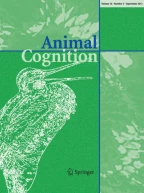Abstract
Experiments vary in their ability to distinguish between competing hypotheses. In tests on primate cognition the majority of this variation is due to an experimenter’s ability to test primates in valid settings while providing the adequate amount of experimental control. While experimenters studying primate cognition can use methods of control perfected in captivity, it is still very unclear how to design and then objectively evaluate the external validity of new experimental paradigms. I recommend that more effort be allocated to specify how to create relevant test settings for primates. Primate social life is highly competitive. This means that all aspects of primates themselves, including their cognitive abilities, have likely been shaped by the need to out-compete conspecifics. Based on this hypothesis, sophisticated cognitive abilities of primates might best be demonstrated in competitive contexts. Thus, it is suggested that one possible measure of validity is whether investigators integrate a competitive component into their experimental designs. To evaluate this methodological prediction I review the literature on chimpanzee perspective-taking as a case study including several recent studies that include a competitive component in their experimental designs.
Similar content being viewed by others
Author information
Authors and Affiliations
Additional information
Accepted after revision: 8 April 2001
Electronic Publication
Rights and permissions
About this article
Cite this article
Hare, B. Can competitive paradigms increase the validity of experiments on primate social cognition?. Anim.Cogn. 4, 269–280 (2001). https://doi.org/10.1007/s100710100084
Received:
Published:
Issue Date:
DOI: https://doi.org/10.1007/s100710100084
